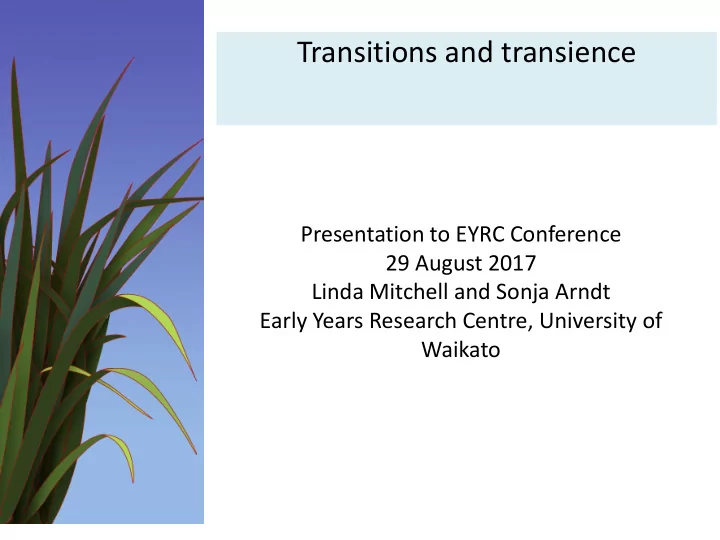

Transitions ¡and ¡transience Presentation ¡to ¡EYRC ¡Conference 29 ¡August ¡2017 Linda ¡Mitchell ¡and ¡Sonja ¡Arndt Early ¡Years ¡Research ¡Centre, ¡University ¡of ¡ Waikato
Structure ¡of ¡this ¡presentation • National ¡evaluation ¡of ¡New ¡Zealand’s ¡ECE ¡ Participation ¡Programme ¡– the ¡study • Findings: ¡Experiences ¡of ¡“transient” ¡priority ¡ children ¡in ¡transitioning ¡to ¡school • What ¡needs ¡to ¡be ¡prioritised? ¡
The ¡study Evaluation ¡of ¡New ¡Zealand ¡ • programme ¡of ¡ECE ¡participation ¡ initiatives ‘Priority’ ¡children ¡-‑ Māori ¡and ¡ • Pasifika ¡children ¡and ¡children ¡ from ¡low ¡socio-‑economic ¡ communities ¡who ¡are ¡not ¡ participating ¡in ¡ECE ¡ Engaging ¡Priority ¡Families ¡(EPF) ¡ ¡– • a ¡coordinator ¡works ¡as ¡a ¡‘broker’ ¡ between ¡families ¡and ¡ECE ¡and ¡ supports ¡learning ¡at ¡home ¡and ¡ transition ¡to ¡school
Theoretical ¡frame ¡and ¡research ¡ questions An ¡ecological ¡theoretical ¡frame ¡ • What ¡did ¡the ¡children’s ¡participation ¡in ¡ECE ¡ look ¡like? • What ¡learning ¡foundations ¡did ¡the ¡children ¡ develop ¡during ¡the ¡time ¡they ¡participated ¡in ¡ ECE ¡and ¡EPF? • How ¡did ¡the ¡children ¡experience ¡transition ¡to ¡ school?
Methodology • Observations ¡of ¡18 ¡case ¡study ¡children ¡at ¡ECE ¡centre • Analysis ¡of ¡assessment ¡documentation ¡of ¡the ¡18 ¡ children ¡against ¡strands ¡of ¡Te ¡Whāriki (ECE ¡curriculum) • Interviews ¡with ¡parents, ¡EPF ¡coordinators, ¡ECE ¡head ¡ teacher/supervisor, ¡new ¡entrant ¡teacher • Mapping ¡of ¡transition ¡against ¡NZC ¡(school ¡curriculum) ¡ key ¡competencies • Study ¡took ¡place ¡over ¡six ¡months • Informed ¡consent
ECE ¡and ¡School ¡curriculum ¡alignment
A ¡range ¡of ¡transition ¡experiences ¡ (n=18) • Four ¡children ¡very ¡positive ¡experience ¡– in ¡ way ¡they ¡settled ¡and ¡classroom ¡work • Six ¡children ¡settled ¡well ¡and ¡had ¡challenges ¡in ¡ classroom ¡work ¡ • Three ¡children ¡did ¡not ¡settle ¡quickly, ¡ challenging ¡behaviour ¡and ¡challenges ¡in ¡ classroom ¡work • Four ¡children ¡left ¡to ¡another ¡city, ¡one ¡stayed ¡ in ¡ECE
Variable ¡preparation ¡for ¡transition ¡to ¡ school ¡(n=13) • Pre-‑visits ¡to ¡local ¡schools ¡(9) • Health ¡and ¡Before ¡School ¡checks ¡organised ¡by ¡ ECE ¡(8) ¡and ¡Plunket ¡(2) • ECE ¡assessment ¡information ¡passed ¡on ¡to ¡ school ¡(5)
What ¡supported ¡positive ¡transition • Strong ¡learning ¡ foundations ¡in ¡ECE ¡setting ¡ across ¡strands ¡of ¡Te ¡ Whāriki • New ¡entrant ¡teachers ¡ noticed, ¡recognised ¡and ¡ responded ¡to ¡children’s ¡ strengths • Cultural ¡bridges ¡to ¡ support ¡transition • Continuity ¡of ¡support ¡ from ¡ECE, ¡EPF ¡ coordinator, ¡parent
A ¡positive ¡transition: ¡Roimata Strong ¡foundations ¡on ¡indicators ¡ A ¡key ¡factor: ¡familiarity ¡with ¡using ¡ • of ¡belonging, ¡wellbeing, ¡ language ¡and ¡text contribution ¡and ¡communication Mother ¡helped ¡at ¡Roimata’s • Roimata loves ¡to ¡read ¡even ¡though ¡ playgroup ¡ she ¡doesn’t ¡know ¡how ¡to ¡read. ¡She ¡ New ¡entrant ¡teacher ¡had ¡taught ¡ spends ¡her ¡time ¡and ¡she ¡looks ¡at ¡ • sibling ¡and ¡knew ¡family, ¡but ¡no ¡ books ¡. ¡. ¡. ¡She ¡tells ¡her ¡story ¡about ¡ school ¡visit the ¡pictures. ¡(Mum) Love ¡of ¡books ¡encouraged ¡at ¡ • home ¡and ¡by ¡EPF ¡coordinator ¡ Academically ¡I ¡can ¡tell ¡she ¡has ¡been ¡ who ¡provided ¡resources in ¡the ¡preschool ¡because ¡of ¡the ¡ Family ¡expectations ¡around ¡ language. ¡Although ¡English ¡is ¡not ¡her ¡ • academic ¡progress ¡and ¡behaviour ¡ first ¡language, ¡she ¡was ¡talking ¡very ¡ well, ¡very ¡clearly ¡and ¡she ¡could ¡do ¡it ¡ confidently. ¡(New ¡entrant ¡teacher)
Factors ¡contributing ¡to ¡challenging ¡ transitions ¡ • Family ¡transience • Changes ¡in ¡school • Poor ¡quality ¡ECE • Undiagnosed ¡health ¡issues • Competencies ¡not ¡recognised ¡by ¡new ¡entrant ¡ teacher
A ¡challenging ¡transition: ¡An ¡ undiagnosed ¡health ¡issue: ¡ School ¡nurse ¡and ¡new ¡entrant ¡ ECE ¡supervisor teacher • “Not ¡ready ¡with ¡words ¡and ¡ Diagnosed ¡by ¡school ¡nurse ¡as ¡ • having ¡hearing ¡and ¡vision ¡ numbers” ¡and ¡“has ¡poor ¡ problems listening ¡skills” ¡and ¡“lacks ¡ New ¡entrant ¡teacher ¡observed ¡ • focus” “He ¡can ¡be ¡right ¡near ¡me, ¡like ¡ • Did ¡not ¡know ¡whether ¡ within ¡a ¡metre ¡and ¡I ¡say ¡his ¡ Before ¡School ¡Check ¡had ¡ name ¡and ¡he ¡doesn’t ¡even ¡ been ¡done turn ¡his ¡head”. ¡“One ¡of ¡our ¡ challenging ¡behaviour ¡ children, ¡you ¡know ¡like ¡with ¡ hitting ¡kinds ¡of ¡things”. ¡
A ¡challenging ¡transition: ¡Caleb Remained ¡in ¡ECE ¡a ¡month ¡ • after ¡turning ¡5 He ¡had ¡almost ¡toddler-‑like ¡ Enrolled ¡by ¡EPF ¡coordinator ¡ tantrums, ¡where ¡as ¡soon ¡as ¡he’s ¡ • and ¡mum been ¡directed ¡or ¡being ¡guided ¡he ¡ gets ¡upset ¡with ¡that; ¡he ¡wants ¡to ¡ School ¡visits ¡with ¡ECE ¡teacher • do ¡what ¡he ¡wants ¡to ¡do ¡when ¡he ¡ But ¡placed ¡in ¡new ¡classroom, ¡ • wants ¡to ¡do ¡it ¡and ¡if ¡he ¡can’t ¡he ¡ new ¡teacher ¡who ¡had ¡no ¡ will ¡lie ¡[down] ¡and ¡cry ¡… ¡those ¡ information first ¡few ¡days ¡he ¡would ¡scream ¡ Caleb’s ¡attendance ¡disrupted ¡ • and ¡tell ¡me ¡he ¡couldn’t ¡do ¡ by ¡a ¡month’s ¡absence something. ¡ Pre-‑testing ¡at ¡school ¡– did ¡not ¡ • recognise ¡competencies ¡ developed ¡at ¡ECE
Complex ¡transitions ¡ • 4 ¡children ¡moved ¡cities ¡or ¡did ¡not ¡stay ¡at ¡the ¡ school ¡they ¡initially ¡transitioned ¡to ¡or ¡were ¡ prepared ¡to ¡transition ¡to • Families’ ¡living ¡situations ¡unpredictable • Beneficial ¡learning ¡foundations ¡in ¡ECE • Difficult ¡collaborations ¡ • Not ¡much ¡room ¡for ¡shared ¡understandings • Disrupted ¡any ¡transitioning ¡relationships ¡that ¡ were ¡happening.
Family ¡unpredictability ¡and ¡transience Children ¡who ¡left ¡the ¡study: • Anahera’s mother ¡is ¡a ¡student ¡– moved ¡cities • Aiden’s ¡family ¡moved ¡to ¡another ¡city • Blake ¡moved ¡to ¡another ¡country • Mark ¡had ¡health ¡issues ¡and ¡couldn’t ¡go ¡to ¡ school Children’s ¡transitions ¡may ¡become ¡secondary ¡to ¡ family ¡realities…
Conclusion • High ¡quality ¡ECE ¡ • Sharing ¡of ¡assessment ¡information ¡and ¡ pedagogical ¡approaches ¡between ¡ECE ¡and ¡ new ¡entrant ¡teachers ¡ • Connecting ¡with ¡funds ¡of ¡knowledge ¡the ¡child ¡ brings • Major ¡players ¡in ¡children’s ¡lives ¡working ¡ together ¡with ¡shared ¡aims ¡around ¡transition • Transition ¡is ¡a ¡process
Recommend
More recommend